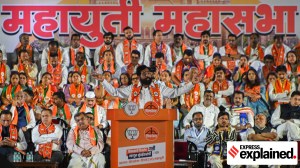Political rationalisation
Rationalising one8217;s inexcusable actions is a common phenomenon. Politicians have mastered this art.

Rationalising one8217;s inexcusable actions is a common phenomenon. Politicians have mastered this art. Former prime minister H.D. Deve Gowda solemnly rationalised the indefensible breach of agreement to relinquish power by JD S to BJP in Karnataka on the ground that his son, Chief Minister H.D. Kumaraswamy, was humiliated by the BJP. To ordinary mortals, it is clear that sheer greed for power was the real reason for breaking the pledge. The consequence has been imposition of president8217;s rule in Karnataka and people in the state have to suffer the tumult of fresh elections.
It is expected that if a member of a political party is convicted of a serious crime like murder, there are two options open to him: his resignation or expulsion from the party. However Sharad Yadav, president of the JD U has stated that no disciplinary action is necessary against the members of his party who were found guilty of murder by a Patna court because 8220;they have already been punished by the court. We will not take any action against them, as no one can be punished twice8221;. This is a baffling interpretation of the double jeopardy guarantee and is the ultimate in the art of rationalising. Moliere rightly pointed out that there8217;s nothing people can8217;t contrive and find justification for their discreditable acts.
Dithering on the N-deal
The nagging question on everyone8217;s mind is whether there will be mid-term elections, which people generally do not favour, but appear inevitable in view of the rigid stand taken by the Congress and the Left parties on the nuclear deal. But politics is the art of the possible, and there is great scope for rationalisation for the ultimate decision, which may be either to fully implement the nuclear deal or dilute it to accommodate some concerns of the Left. There should be no endless dithering over this vital issue. Besides, the bookies are already into their act. The odds are against mid-term elections. I agree. The real saviour may well be Lalu Prasad Yadav, with his unique brand of Bihari bonhomie, humour and political realism.
Judicial misconduct
The revealations made by U.S. Supreme Court Justice Clarence Thomas in his autobiography, My Grandfather8217;s Son, as extracted in the press, make appalling reading. There is brazen confession of judicial partisanship in the landmark decision on Bush v. Gore. Justice Thomas, who intensely disliked Al Gore, the presidential candidate, unabashedly says, 8220;I voted to shut down the vote-counting in Florida by Al 8212; because if he8217;d kept going he might have won. I helped swing the court to narrowly achieve the Bush restoration. Al Gore8217;s true claims didn8217;t matter in that standoff.8221; This is shocking judicial misconduct. In the light of Justice Thomas8217; confessions, Justice Breyer8217;s dissenting observations in the case have a compelling relevance: 8220;Although we may never know with complete certainty the identity of the winner of this year8217;s presidential election, the identity of the loser is perfectly clear. It is the nation8217;s confidence in the judge as an impartial guardian of the rule of law.8221; It is incredible that a judge who on his own admission has proven false to his judicial oath can continue on the bench of the nation8217;s highest judiciary. In India such a judge would not be tolerated on the bench.
Wedding parties
Weddings are festive occasions. It would be churlish to spoil them by imposing restrictions on playing of music and other associated paraphernalia. At the same time regard must be had to the convenience of other persons and also to the problem of noise pollution. Probably that was the reason for the Delhi High Court8217;s recent order inter alia banning bands beyond 10 p.m. at farmhouse weddings. Wedding celebrations invariably start late and 10 p.m. is unrealistic. In any case, will the police have the heart to spoil a wedding party by enforcing the high court8217;s directive after they have been profusely treated as special guests by the families? I doubt it.
- 01
- 02
- 03
- 04
- 05































